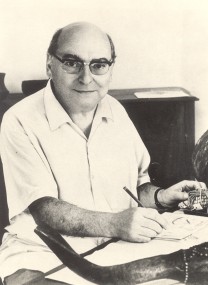Hermann Baumann was born in Freiburg in 1902. Due to his early interest in Anthropology, History and African Cultures he began reading scientific books in his childhood and youth.
Baumann studied Anthropology in Freiburg, Leipzig and Berlin. He graduated in 1925. Since 1921 he worked at the Ethnological Museum Berlin (formerly: Staatliches Museum für Völkerkunde). At this time he also did his first field research in Angola.
In 1935 Baumann finished his habilitation thesis. In 1939 he took up a professorship at the University in Vienna, where he lectured until 1945. Being a member of the National Socialist German Workers Party (Nationalsozialistische Deutsche Arbeiterpartei, NSDAP) he lost his employment after World War II and returned to Germany.
After receiving his denazification certificate Baumann lectured in Berlin, Mainz and Frankfurt. In 1954 he did a further field research in Angola.
In 1955 Baumann took up a professorship at the Institute for Ethnology and African Studies in Munich, where he lectured until his retirement in 1967. Until his death Baumann worked on a collected edition about African ethnic groups.
Baumann was a representative of Kulturhistorie and diffusionism who opposed the ideas of Kulturkreislehre. He emphasized the importance of single case studies on ethnic groups as well as the research on cultural exchange among several groups in a broader historical context.
Hermann Baumann died in 1972.
(This text based on Alsayad/Seiler (eds.) 2005: Ethnologen-Lexikon. Berlin: WeißenseeVerlag, by courtesy of WeißenseeVerlag and Sibylle Alsayad)
Short Portrait: Hermann Baumann

Hermann Baumann
 further information
further information

